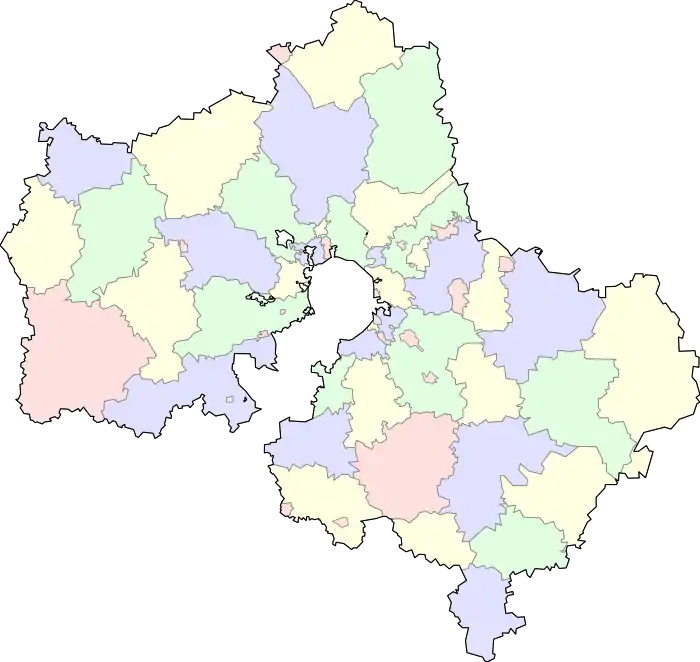Administrative divisions of Moscow Oblast
This is a list of the administrative and municipal divisions of Moscow Oblast, a federal subject of Russia.
 | |
| Administrative center | None[1] |
|---|---|
| Administrative structure (as of 2014[2][3][4][5]) | |
| Administrative districts | 38 |
| Cities/towns | 79 |
| Urban‑type settlements | 70 |
| n/a | |
| Rural localities | 6,122[6] |
| Closed localities | 5 |
| Municipal structure (as of 2009[6]) | |
| Municipal districts | 36 |
| Urban okrugs | 36 |
| Urban settlements | 114 |
| Rural settlements | 192 |
Moscow Oblast is located in the Central Federal District of Russia, and surrounds Moscow, the capital of Russia. While Moscow hosts the majority of the government bodies of the oblast, it does not officially serve as the oblast's administrative center[1] and is not otherwise associated with the oblast either administratively or municipally.
The oblast is, as are other Russian federal subjects, subdivided for the purposes of the state administration and for the purposes of the local self-government, the rights to which are guaranteed by the Constitution of Russia. While the administrative and municipal divisions are not required by law to be identical, the system of municipal divisions in Moscow Oblast, having been created on the basis of existing administrative divisions, has only minor differences from the system of administrative divisions.
History
The oblast was established within the Russian Soviet Federative Socialist Republic on January 14, 1929, as Central Industrial Oblast (Центральнопромышленная область) from abolished Moscow, Ryazan, Tula, and Tver Governorates, as well as from parts of Kaluga and Vladimir Governorates. On June 3, 1929, the oblast was given its present name.
In September 1937, the oblast was split into Moscow, Ryazan, and Tula Oblasts, thus establishing itself in its present borders.
A part of Moscow Oblast's territory, including the towns of Troitsk, Shcherbinka, and Moskovsky, urban-type settlements of Kokoshkino and Kiyevsky, as well as parts of territories of Leninsky, Naro-Fominsky, and Podolsky Districts, was transferred to the federal city of Moscow on July 1, 2012.[7][8]
Administrative division structure
In terms of administrative division, the Oblast is divided into:[2]
- cities/towns under the Oblast administration;
- urban-type settlements under the Oblast administration;
- closed administrative-territorial formations.
Municipal divisions structure
In terms of the local self-government, the Oblast is divided into:
List of administrative and municipal divisions


Differences in municipal and administrative divisions
In terms of administrative division,
- Krasnoznamensk, Molodyozhny, and Voskhod Urban Okrugs correspond to closed administrative-territorial formations.
- The closed administrative-territorial formations of Vlasikha and Zvyozdny gorodok have not yet been municipally incorporated as urban okrugs (as of January 2009).
- All other urban okrugs correspond to the cities/towns under the oblast jurisdiction.
See also
References
Notes
- According to Article 24 of the Charter of Moscow Oblast, the government bodies of the oblast are located in the city of Moscow and throughout the territory of Moscow Oblast. However, Moscow is not officially named to be the administrative center of the oblast.
- Московская областная Дума. Закон №12/2001-ОЗ от 17 января 2001 г. «Об административно-территориальном устройстве Московской области», в ред. Закона №26/2009-ОЗ от 27 марта 2009 г. (Moscow Oblast Duma. Law #12/2001-OZ of January 17, 2001 On the Administrative and Territorial Structure of Moscow Oblast, as amended by the Law #26/2009-OZ of March 27, 2009. ).
- Государственный комитет Российской Федерации по статистике. Комитет Российской Федерации по стандартизации, метрологии и сертификации. №ОК 019-95 1 января 1997 г. «Общероссийский классификатор объектов административно-территориального деления. Код 46», в ред. изменения №278/2015 от 1 января 2016 г.. (State Statistics Committee of the Russian Federation. Committee of the Russian Federation on Standardization, Metrology, and Certification. #OK 019-95 January 1, 1997 Russian Classification of Objects of Administrative Division (OKATO). Code 46, as amended by the Amendment #278/2015 of January 1, 2016. ).
- Президент Российской Федерации. Указ №70 от 19 января 2009 г. «О преобразовании закрытого военного городка № 22/1 в закрытое административно-территориальное образование — посёлок Власиха Московской области». (President of the Russian Federation. Decree #70 of January 19, 2009 On Transformation of the Closed Military Locality #22/1 into the Closed Administrative-Territorial Formation of the Settlement of Vlasikha of Moscow Oblast. ).
- Президент Российской Федерации. Указ №68 от 19 января 2009 г. «О преобразовании закрытого военного городка № 1 в закрытое административно-территориальное образование — посёлок Звёздный городок Московской области». (President of the Russian Federation. Decree #68 of January 19, 2009 On Transformation of the Closed Military Locality #1 into the Closed Administrative-Territorial Formation of the Settlement of Zvyozdny gorodok of Moscow Oblast. ).
- The numbers were calculated based on the data available in the laws of Moscow Oblast dealing with districts' composition. Sources used in calculations are listed in the composition tables for each district.
- Official website of the Government of Moscow. Draft of adopted measures of the capital and oblast governments with regards to the expansion of the borders of Moscow (in Russian)
- Проценко, Любовь (July 2, 2012). С 00 часов – Москва (in Russian). Rossiyskaya Gazeta. Retrieved July 4, 2012.
- District names abbreviations are unofficial and are for illustrative purposes only
- Московская областная Дума. Закон №26/2009-ОЗ от 27 марта 2009 г. «О преобразовании города Лосино-Петровского Щёлковского района Московской области и города Электрогорска Павлово-Посадского района Московской области и внесении изменений в закон Московской области "Об административно-территориальном устройстве Московской области"». (Moscow Oblast Duma. Law #26/2009-OZ of March 27, 2009 On Transformation of the City of Losino-Petrovsky of Shchyolkovsky District of Moscow Oblast and of the City of Elektrogorsk of Pavlovo-Posadsky District of Moscow Oblast and on Amending the Law of Moscow Oblast 'On the Administrative and Territorial Structure of Moscow Oblast'. ).
- As of February 2009, Vlasikha has not yet been municipally incorporated as an urban okrug
- As of February 2009, Zvyozdny gorodok has not yet been municipally incorporated as an urban okrug
Sources
- Московская областная Дума. Закон №11/2013-ОЗ от 31 января 2013 г. «Об административно-территориальном устройстве Московской области», в ред. Закона №249/2019-ОЗ от 29 ноября 2019 г. «О внесении изменений в Закон Московской области "Об административно-территориальном устройстве Московской области"». Вступил в силу на следующий день после официального опубликования (13 января 2013 г.). Опубликован: "Ежедневные Новости. Подмосковье", №24, 12 февраля 2013 г. (Moscow Oblast Duma. Law #11/2013-OZ of January 31, 2013 On the Administrative-Territorial Structure of Moscow Oblast, as amended by the Law #249/2019-OZ of November 29, 2019 On amending the Law of Moscow Oblast "On the Administrative-Territorial Structure of Moscow Oblast". Effective as of the day following the day of the official publication (January 13, 2013).).
- Губернатор Московской области. Постановление №123-ПГ от 28 сентября 2010 г. «Об учётных данных административно-территориальных и территориальных единиц Московской области», в ред. Постановления №252-ПГ от 26 июня 2015 г. «О внесении изменения в учётные данные административно-территориальных и территориальных единиц Московской области». Опубликован: "Информационный вестник Правительства МО", №10, 30 октября 2010 г. (Governor of Moscow Oblast. Resolution #123-PG of September 28, 2010 On the Inventory Data of the Administrative-Territorial and Territorial Units of Moscow Oblast, as amended by the Resolution #252-PG of June 26, 2015 On Amending the Inventory Data of the Administrative-Territorial and Territorial Units of Moscow Oblast. ).
- Московская областная Дума. №55/96-ОЗ 11 декабря 1996 г. «Устав Московской области», в ред. Закона №217/2007-ОЗ от 24 декабря 2007 г. (Moscow Oblast Duma. #55/96-OZ December 11, 1996 Charter of Moscow Oblast, as amended by the Law #217/2007-OZ of December 24, 2007. ).